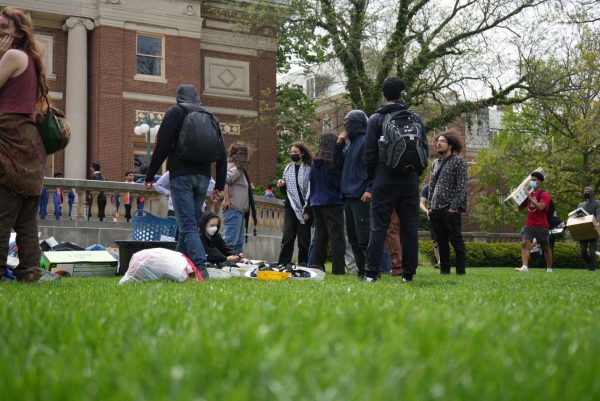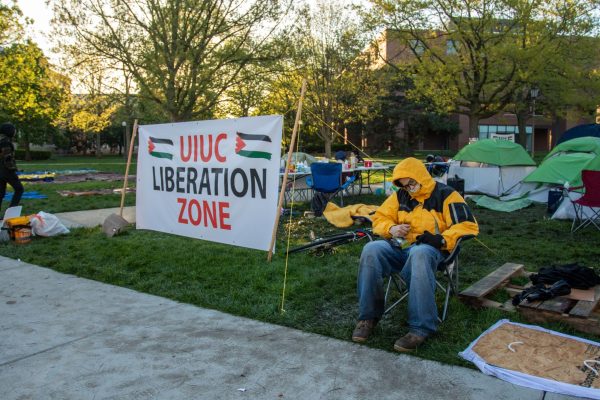Like the rest of his teammates on the Illinois tennis team, Bruno Abdelnour quite often finds himself at the Atkins Tennis Center practicing his forehands and backhands. He does other training and conditioning exercises to get him ready for the fall season.
Like every Illinois athlete, he meets with academic advisers and completes his mandatory study time. Basically, he does everything he’s told to do, despite the incredible obstacles and barriers he’s had to overcome.
But simply getting by has never much appealed to the junior. He wants to do whatever he can to make the most of his final two years in Champaign-Urbana — and not just on the tennis court.
In the fall just two short years ago, Abdelnour was trying to decide where he wanted to attend college. He had spent the last three years as a member of the Tennis Club of Hauts de Nimes in France after growing up in Aleppo, Syria, where he used to play on courts that couldn’t compare to the ones he plays at now.
Playing his brother Marc in the intense heat every day growing up on those rough courts, made of large blocks comparable to playing on a sidewalk, helped shape him into what he is today, and he wouldn’t change that for the world.
Get The Daily Illini in your inbox!
Abdelnour’s family hired a college placement service to help him find a college. He said his first choice was Illinois, followed by Texas A&M and Rice. Though a strong tennis program was important to him, a prestigious engineering program was just as important to his decision.
Insert head coach Brad Dancer. Based on a recommendation, Dancer began speaking with Abdelnour to get him to commit to Illinois as soon as possible, only knowing about Abdelnour’s competitiveness and ability to play solid on the baseline.
“We took a chance on a friend of mine who vouched for Bruno, his character and his charisma,” Dancer said. “We had never seen him play before.”
At the time, the Illini were shorthanded to say the least. Marek Czerwinski and Meedo El Tabakh were the only seniors on the roster, but El Tabakh did not compete due to injuries. Then-juniors Abe Souza and Connor Roth were returning with then-sophomore Dennis Nevolo. Johnny Hamui was transferring from Florida, but the lineup was far from set.
After persuasion by Dancer, Abdelnour was enrolled in the spring of 2010.
Abdelnour now admits that transitioning to collegiate tennis was not easy when he first arrived.
“I was thinking about a lot of things, I was a little shy, I didn’t know how to talk to Brad (Dancer) or (assistant coach Marcos Asse) about how things were done here,” Abdelnour said. “It took me a month or so to find my game back and be able to communicate better with coaches and teammates.”
Abdelnour initially found it hard to communicate with his coaches, teammates and teachers — breaking a language barrier can be rather difficult.
“It was a little hard at the beginning,” Abdelnour said. “I just tried to pick it up fast, and it helps a lot when you’re around people who speak English all the time.”
Abdelnour has never been one to shy away from a challenge.
He already knew how to understand English, but speaking it was a different challenge. All it took, though, was time before any problems on and off the court started to go away. The coaches were able to give him better instruction and his grades improved — though they were never very bad in the first place.
He recalls during his freshman year taking a chemistry class with about 300 students. After the first exam he said he was getting a B-plus, a solid grade but not up to his usual standards. As the semester went on, he was consistently scoring A’s and A-pluses. At semester’s end his teacher contacted him to let him know he would receive an A-plus for the semester, the only student in the class to do so.
“It made me realize I was right about focusing on school and not just on tennis because I realized I could do something good with that, too,” Abdelnour said.
On the court, Abdelnour played sparingly. His first match was among his most notable, with him being a late addition to the lineup in a key match against Notre Dame after Nevolo was out with sickness. He won his match and helped the Illini pick up a win without its top-ranked player. He would finish the season 7-3 in singles play, including a 4-1 record in conference matches, primarily at the No. 6 position.
After spending the summer on campus, things continued to get better entering the fall 2010 semester. Once a rather shy member of the team, Abdelnour was beginning to open up and start making jokes. They reciprocated and still do; the hundreds of pushups and sit ups he does every day and his abs continue to be a running joke among the team.
“He’s really broken out of his shell quite a bit,” Czerwinski said. “At the beginning he was a lot more timid because he didn’t have the communication abilities that now he has, so he’s gotten a ton better with it. He’s just felt a lot more confident, I think, about himself. You can tell in the way he carries himself and in the fact that he just jokes around with us.
“At the beginning, I think he felt a little bit guarded and didn’t know when we were joking around with him and didn’t have exactly that great easy-going feeling with us all the time. He was a little on edge at the very beginning but he’s gotten so much better with us and everyone loves him,” Czerwinski added.
Then in this past spring, Abdelnour started to find himself in a familiar position, struggling to find time in the lineup with the emergence of a healthy KU Singh and the return of Roy Kalmanovich, who originally left the team after spring 2009. That left Abdelnour fighting for playing time with fellow sophomore Stephen Hoh.
Being in and out of the lineup took its toll on Abdelnour. He said he always felt great pressure to win at the No. 6 singles spot.
“I feel like at (No.) 6 I should win my matches,” Abdelnour said. “If you win, OK, you should have won. If you lose, that’s terrible, so there was a no-win situation.”
By the end of the season, though, Abdelnour began finding consistency and was regularly playing at either the No. 5 or 6 singles position before finishing the dual season 6-10.
What helped Abdelnour improve through last spring and since he’s arrived to campus, Dancer said, is his growth on the mental aspect of the game because he was taking things “too serious,” which would cause him to over-serve and play tight.
“We talked a lot about relaxation routines and visualization routines in between point processes,” Dancer said. “Once he started committing to that, that’s when we saw his game take off last spring, and we really felt at the end of the spring he was playing as well as anyone on the team.”
In the classroom, Abdelnour continued his strong performance. He helped the men’s tennis team earn a 3.34 cumulative grade point average, the highest of the Illini men’s athletic teams. His 4.0 GPA in the spring semester helped him earn the Outstanding Scholar-Athlete Award among male sophomore athletes. He was also named a Big Ten distinguished scholar with 50 other Illinois athletes. Through his first year and a half on campus he has a 3.96 grade point average, with A-pluses in the chemistry class, two calculus classes and one physics class.
“Within the first few days I was amazed by his work ethic not only on the tennis court and fitness, but in school,” Kalmanovich said. “Every moment that I’d see him, he’d be studying. He does everything as hard as he can, and I feel that’s something that’s remarkably rare at this age. Everything he does, he does it 100 percent, and I’m just amazed that he can do that.”
It would be easy to attribute any struggles Abdelnour has had on the tennis court to outside influences. His native country of Syria has been undergoing a revolution since March.
Abdelnour insists that because few protests were happening around his hometown of Aleppo during the season, he was able to stay focused on tennis.
“I just try to do one thing at a time and not think about many things at the same time,” Abdelnour said. “Luckily enough, when things were happening at first in Syria, my city was really safe. The bad things that were going on were really far from my city.”
By early June, more than 100 protestors and 120 security forces were reported killed. Syrian president Bashar al-Assad said he would open talks with the opposition, but it declined until Assad would stop his crackdown on protestors. On Aug. 18, President Barack Obama called for Assad to step down in a joint statement with Britain, France and Germany.
There are two sides to every story, and the situation in Syria is no exception. Having seen what was happening firsthand after spending the summer at home, Abdelnour knew if he simply didn’t participate in protests, he’d be fine. He stresses that both sides were at fault for violence occurring.
“There’s violence going on both ways, the soldiers are violent, but when the protestors are violent, you have to be careful, too,” Abdelnour said. “If you protest without violence, that’s fine, you’re free to do that.”
While home, he also had the honor of playing for Syria’s Davis Cup team, which was playing in Asia/Oceania Group II, a group higher than it normally plays. Having lost its first match against South Korea, Syria needed to win in the Relegation Play-off to stay alive, but fell 4-1 against Hong Kong.
Though his team didn’t fare well, Abdelnour was a bright spot as he picked up the Syria’s sole point in a 6-2, 6-0 singles win over Nicholas Sayer of Hong Kong. Abdelnour was just the second Syrian player to pick up a Davis Cup win in Group II play, with the first coming in the team’s previous match by his brother, Marc, who recently graduated from Florida Atlantic, where he also played on a collegiate level.
At summer’s end, it was time for Abdelnour to return to campus with a newfound confidence in his game. However, at the time of his departure, protests were finally becoming more common in Aleppo, with the country’s future still uncertain.
“Clearly there’s something in there where were nervous for him and nervous for his family obviously,” Dancer said.
Abdelnour has high hopes for the rest of his time at Illinois. After three semesters in the Division of General Studies, Abdelnour is now in the College of Engineering, a goal of his since arriving at the University. He will officially be in mechanical engineering in October.
“It fits him very well from what I’ve talked to him,” Kalmanovich said. “He’s very interested in that particular field of study, he’s very motivated to study it, so that’s clearly a good decision for him. He’s very intelligent and he’s very proficient in that area so it only makes sense.”
Abdelnour has demonstrated he can balance the workload between class and athletics. Illinois’ engineering school is consistently ranked top 5 in the nation.
“I just really like learning,” Abdelnour said. “It’s weird, but I like learning about the world, and I like doing it by doing math and physics and chemistry. I feel like in engineering you do all these things.”
It’s in large part because of his work ethic that coaches and players respect him so much. In fact, it’s almost taken on a reputation of its own.
“(His work ethic) has pretty much, in a sense, become a little bit of a joke on the team because of how hard he actually does work, he almost does it excessively, which is a great thing actually,” said Czerwinski, who still practices with the team. “He’s actually helped motivate the team because of his work ethic.
“You just look at how fit he is, on the court how hard he works in practice and everything like that, and even more than that is just how much he is working off the court with his schoolwork. It just becomes a joke because he’s taking ice baths and studying during them.”
But at times, the hard work takes a toll. He admits he probably doesn’t sleep as much as he should and that a typical day consists of classes, playing tennis or training, studying and occasionally going out at night. That means little time for watching movies, another one of his passions.
His relationships with his teammates also continue to improve despite the rapidly changing roster. Kalmanovich, who has played with Abdelnour for just seven months, already has a deep respect for him.
“He is one of the most genuinely nice people that I know,” Kalmanovich said. “He is extremely caring, and really feels for other people. He has very respectful qualities as a person and apart from that he’s just a phenomenal teammate. If I need anything, Bruno will help me out and he knows the same thing.”
Abdelnour hopes his hard work ethic will lift him to new heights. He‘s already well on his way to an engineering degree, but still feels he has something to accomplish on the tennis court. Most notably, he wants to become an All-American, a feat accomplished by Nevolo this past season and recently by Illini greats Amer Delic and Kevin Anderson, whose banners hang at Atkins.
Ultimately, the biggest honor for him would be recognition as someone who set an example and standard for current and future Illini tennis players.
“I would like to be someone who helped the program, who people would talk about like, ‘Yeah, we had that guy — he was an engineer, he worked so hard, he had great work ethic, he helped out his teammates,’” Abdelnour said. “To make my story stay with the program and help out the team would be great.”
Post-college plans are still uncertain for Abdelnour. He’s considering playing tennis after he graduates, and Dancer believes that’s the route he’ll take.
However, eventually there will be life after tennis, and he intends to make the most of his degree. He plans on pursuing some sort of research with the hope of helping people, whether through a university or another firm.
Coaches and teammates continue to praise his general love and care of people, which Dancer said will benefit him in the long run.
“I’ve told Bruno for a long time now, he’s gonna make an amazing husband and father someday,” Dancer said. “Hopefully that’s a little ways away for him, but whoever winds up with him is gonna be one very lucky woman. His tennis is outstanding, his academics are outstanding, but all of that is dwarfed to his character and ability to relate to other people.”
Whatever the future may hold, one thing is certain: Abdelnour will do his best to live up to the standard he holds himself to and achieve all the goals set before him.
Obstacles will undoubtedly arise both on the tennis court and off, but based on what he’s been able to show thus far, there’s no reason to prove they can’t be overcome.
“He’s gonna go places in his life,” Dancer said. “I just feel fortunate to coach him, I really do.”






